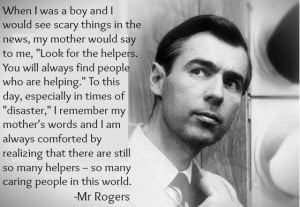
Gaudete means rejoice. This third Sunday of Advent, called Gaudete Sunday — designated by a color shift from violet to rose in the Advent wreath candles — is the signal that it’s OK to start acting more Christmasy. Up until now, Advent tradition has dictated that we be reverent and expectant without being too boisterous, or fixated on Christmas itself. That has created some tension between the religious holiday and the world around us. But starting with Gaudete Sunday, we’ve got the green light to start getting excited.
Of course this year, Gaudete Sunday is coming two days after this nation has suffered the unthinkable tragedy at Sandy Hook Elementary School in Newtown, CT, with 20 children and 8 adults including the shooter losing their lives due to the combination of a disturbed mind and firearms. At moments like this the world can seem a very bleak place; a very fallen place.
This might seem like an odd time to be talking about rejoicing. This Sunday is called Gaudete because that’s the first Latin word in its traditional liturgy. The full line is: “Rejoice in the Lord always.” Always. Not just “rejoice in the Lord because things are good” or “rejoice in the Lord when something great happens,” but “rejoice in the Lord always.”
Those opening lines of the service and a reading in today’s Revised Common Lectionary are taken from Philippians 4 and the full passage — not all of which is said on Sunday — offers some very powerful counsel in the face of Friday’s tragedy:
Rejoice in the Lord always; again I will say, Rejoice. Let your gentleness be known to everyone. The Lord is near. Do not worry about anything, but in everything by prayer and supplication with thanksgiving let your requests be made known to God. And the peace of God, which surpasses all understanding, will guard your hearts and your minds in Christ Jesus.
Finally, beloved, whatever is true, whatever is honorable, whatever is just, whatever is pure, whatever is pleasing, whatever is commendable, if there is any excellence and if there is anything worthy of praise, think about these things. Keep on doing the things that you have learned and received and heard and seen in me, and the God of peace will be with you. (Philippians 4:4-9)
As a long-time contemplative with experience in both Eastern and Western traditions, I’m always struck by how powerfully mystical these paragraphs sound, and how this advice could as easily be found in the Baghavad Gita or teachings of the Buddha: “Do not worry about anything”; “the peace of God, which surpasses all understanding, will guard your hearts and your minds.”
Even more powerful and significant, especially in the face of tragedy, is the second part: “whatever is true, whatever is honorable, whatever is just, whatever is pure, whatever is pleasing, whatever is commendable, if there is any excellence and if there is anything worthy of praise, think about these things. Keep on doing the things that you have learned and received and heard and seen in me, and the God of peace will be with you.”
In the wake of tragedy and when confronted with evil, the temptation often is to wallow in it — to bemoan the wickedness of the world. The world around Paul, as he was writing these words, was certainly hostile. He was in prison! The message of good news he was preaching was opposed both by his own native Jewish people and by the occupying Roman Empire. And yet Paul says, put your thoughts on what’s good and beautiful and keep doing the right things and you’ll have peace.

It reminds me of a post I saw numerous times in different forms on Facebook on Friday as people were processing what had happened. It’s a photo of Mr. Rogers (Fred Rogers) with an overlaid quote of him saying, “When I was a boy and I would see scary things in the news, my mother would say to me, ‘Look for the helpers. You will always find people who are helping.’ To this day, especially in times of ‘disaster,’ I remember my mother’s words and I am always comforted by realizing that there are still so many helpers — so many caring people in this world.”
Wherever there is hardship and tragedy, there are people helping, sacrificing. That is beautiful. Living in the aftermath of Hurricane Sandy here in New York, I continue to see people motivated by the desire to be of service, to relieve others’ suffering. (And there’s still much to do.)
So here is something from Friday that is true and pure and commendable for us to put our thoughts on: Victoria Soto was a 27-year-old first-grade teacher at Sandy Hook Elementary School. When the gunfire began, she hid her students in a closet, but stayed out in the room herself. When the shooter entered her classroom and confronted her, she told him her kids were elsewhere. He gunned her down and moved on, leaving some of her students safe and alive. Vicki is dead. The word “hero” is trite in such a situation. Vicki Soto is a saint. In that moment, she fully realized her potential to be good and pure, to be selfless and loving.
On this Gaudete Sunday, while we pray for all those who lost their lives on Friday, children and adults, including the shooter, and all those among their families, friends and community who are affected, let us pause also to celebrate Vicki Soto for her inspiring example. Vicki is not unique. There are always those like her who rise to the occasion. Beauty is there when you look for it, and it can bring us peace.
You can see all my Advent-themed pieces together at patheos.com/blogs/philfoxrose/tag/advent/. Please share this link, or just one to my blog, with anyone you think might be interested. Thanks!












